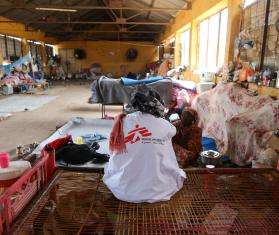NEW YORK, MAY 28, 2020—The international medical humanitarian organization Doctors Without Borders/Médecins Sans Frontières (MSF) called today for new regulations to ensure that personal protective equipment (PPE) is distributed in an equitable and transparent manner during the COVID-19 pandemic.
Since the beginning of the pandemic, competition in the market for medical supplies has reached unprecedented levels, and strong protection measures—notably bans on exports—have been put in place by many countries, including the United States. This has resulted in huge price increases and widespread shortages, particularly of the PPE needed to protect health care workers.
“At the moment, the market for PPE is dominated by a lack of transparency about what is being produced and where, its quality, the amounts in stock, and how they are allocated,” said Thierry Allafort-Duverger, MSF’s general director in Paris. “Assistance to countries facing shortages has been mainly delivered through piecemeal and one-shot actions that are producing uncertainty, chaos, and inequality in the supply chain at a time when health care systems everywhere need predictability and accountability.”
In many countries, national health care providers and other medical care providers are struggling to ensure a steady and reliable supply of the various items needed to ensure protection for medical staff—surgical and FFP2 masks, goggles, medical gowns, and other equipment.
MSF is also encountering difficulties planning for reliable PPE supply for its projects across the world. This situation is not only hampering efforts to contain the spread of COVID-19, but also the ability to continue to provide other essential medical services, such as surgery or treatment for patients suffering from measles, tuberculosis, and other infectious diseases.
A form of regulation is urgently needed to ensure a more equitable distribution of medical supplies to protect medical staff and prevent interruptions in care.
“We must prevent hospitals from becoming amplifiers of the epidemic,” said Christine Jamet, MSF’s director of operations in Geneva. “For this, we need to effectively protect health workers, including in areas where the virus is still at an earlier stage of spreading. For the moment, too many health care workers across the world are unprotected in the face of COVID-19.”
When hospitals become centers for spreading the disease, then health workers become sick and incapacitated, fear spreads, and medical services can’t be maintained. The lack of adequate PPE for health workers can disrupt the provision of health care for everyone.
This has already started to happen in some of the countries where MSF works. In Yemen, our trauma hospital in Aden has been admitting more patients after other hospitals closed their doors. In Kenya, lifesaving MSF activities in one of Nairobi’s poorest areas might have to close in a few weeks if a reliable supply of PPE is not ensured.
Since the beginning of the outbreak, a number of initiatives have been launched by the United Nations, the G20, and the World Health Organization, among others, aiming at improving access to much-needed PPE everywhere. These initiatives represent positive steps on paper, but they won’t be effective unless they have a form of regulatory power which is imposed on individual countries and manufacturers.
In addition to the need for more efficient allocation of PPE, there is also the need for increased production to meet growing demand. Here, too, a regulatory mechanism would be essential to ensure that medical supplies meet the necessary quality standards.
“We and the partners we are working with across the world are struggling against the odds to continue to provide lifesaving care and to respond to COVID-19 in the most difficult circumstances,” Allafort-Duverger said. “But for this, we need transparency and equity to be brought back to the currently out-of-control PPE market—and we can’t count on states or companies to do so voluntarily.”
MSF is currently responding to the COVID-19 pandemic in countries across the world, either by adapting its existing activities or by opening new programs. MSF’s response includes supporting authorities to provide care for COVID-19 patients, keeping essential medical services running, and addressing medical and social needs of the most vulnerable communities.




